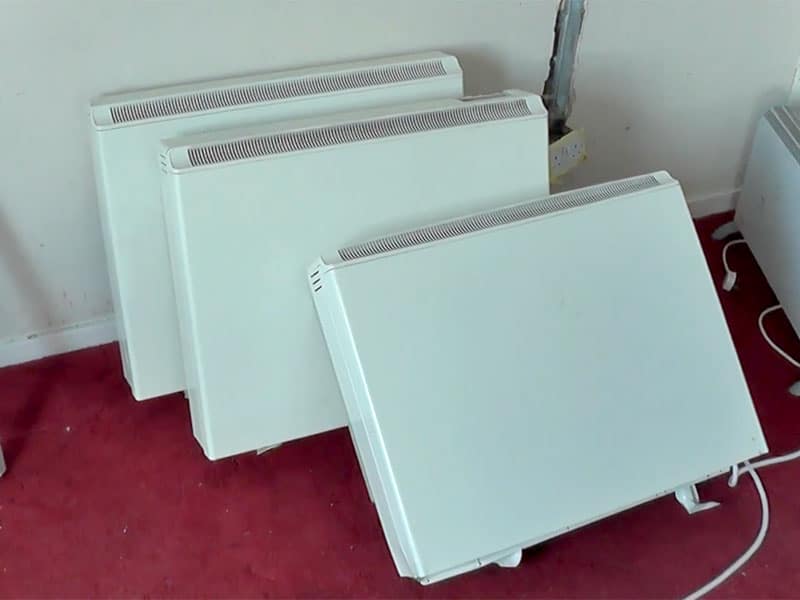Asbestos in storage heaters: what you need to know
A storage heater is a type of electric heater that tends to be found in a property that lacks a gas supply. If you are on the verge of purchasing a property that has this form of heater installed – especially if it is a relatively old property – you may need to be aware of the possibility that if the heater is sufficiently old enough then it could contain asbestos.
But if you do suspect there is a risk of asbestos being present within a particular storage heater, what do you need to know about the risks associated with it – and what steps should you take?

Why and when was asbestos used in storage heaters?
Until about the 1970s, the naturally occurring fibrous silicate mineral called asbestos was still widely seen as something of a wonder substance, with little downside to its use. The material was widely used across various industries on account of its affordability, as well as its heat, fire, and sound resistance.
The effectiveness of asbestos as an insulating material was widely acknowledged, which led to its use in a variety of appliances – storage heaters being just one example.
For the designers of storage heaters during much of the 20th century, asbestos’ impenetrability to any kind of disturbance seemed to make it the perfect material for the storage of heat during the night, and for giving off that heat during the day.
By the 1970s, however, the potentially extremely serious health impacts for many people who came into contact with asbestos were becoming more widely recognised, and political pressure was building for safety measures to be put in place.
The use of asbestos in many appliances was subsequently banned, and with insulating materials that used asbestos having been withdrawn in 1973, no storage heaters made since 1974 should contain any asbestos at all.
Is asbestos in storage heaters safe?
It is not thought that the asbestos contained within a storage heater will pose a risk to health, provided that the heater isn’t damaged or dismantled.
In the event, however, of the heater sustaining such damage or being disassembled, this can present the risk of the asbestos inside the heater being disturbed and released into the air. It is this that can endanger health, given that asbestos fibres getting into the lungs can cause the development of asbestos-related diseases such as mesothelioma, potentially many years or even decades later.
How do I know whether there is asbestos in my storage heater?
One of the first things you will need to do in order to assess whether asbestos could be present in your storage heater, is determine what manufacturer and model of storage heater you have. This will help you work out the storage heater’s age, which – as we touched on – will be one of the principal indicators of the possible presence of asbestos in the appliance.
If you know for sure that the storage heater you have was made prior to 1974, there is a risk that it will contain asbestos. There should not be any asbestos contained within the appliance if it was built at any time from 1974 onwards.
If you look online, you are likely to come across some lists of storage heater models – such as this one on the storageheaters.com website – that are known to contain asbestos. There is no guarantee of any such lists you encounter being exhaustive, so if you are in any doubt about the exact situation for your storage heater, it is best to err on the side of caution, and to treat this as just one part of your research.
For these reasons, even if you do not spot your model of storage heater on any of the aforementioned lists, it might be worth reaching out to the manufacturer and asking whether they have any information on whether asbestos might be contained inside the appliance.
On the other hand, if you have only just bought a brand-new storage heater, there is virtually zero chance of the appliance containing asbestos, so you will be able to rest easy.
Can I remove an old heater that contains asbestos?
No matter how grave your concerns might be about the suspected presence of asbestos in your storage heater, one thing that you must never do under any circumstances, is attempt to open up the storage heater yourself to check for the substance.
Nor should you simply dump any storage heater of yours that you suspect might contain asbestos, as this could put other people at risk of coming into contact with the lethal fibres.
We would instead advise that if you have a storage heater on your site that you wish to replace or no longer require, you get in touch with a licensed contractor or health and safety professional to arrange for it to be safely taken away.
For a more in-depth conversation about the situation with your own storage heater or any of your other requirements in relation to potential asbestos on your premises, please contact Oracle Solutions today, we will be able to provide a fast and competitive asbestos quote.
